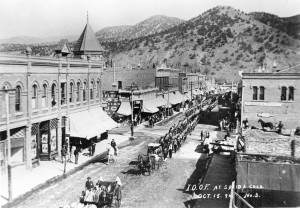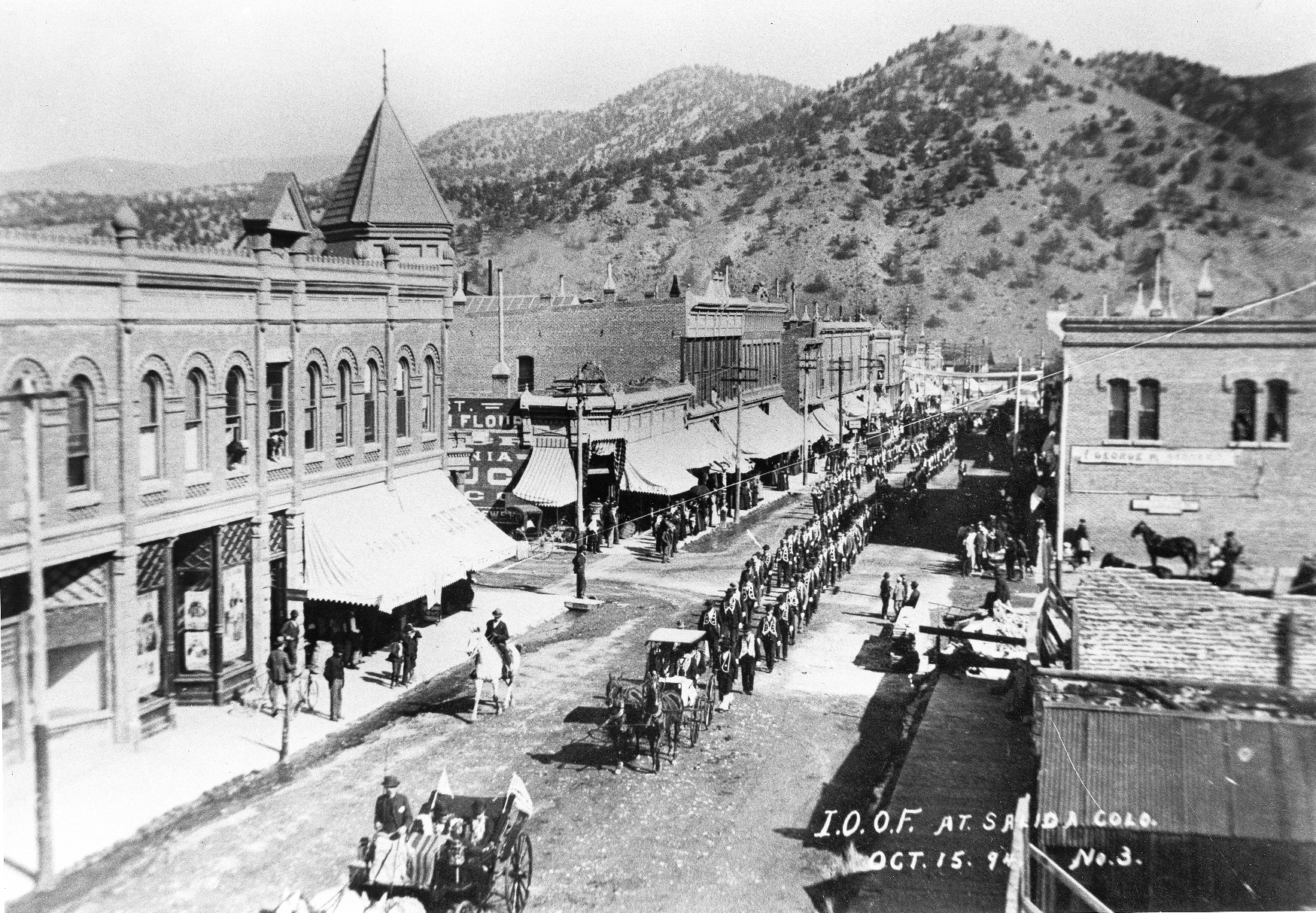by Nathan Ward
The first snowstorm of the winter whipped across Salida but the lights blazed at the Poncha Springs Grange hall. The smell of fried chicken floated out through the snowflakes as a few hearty souls gathered to meet Frank Pegoraro, the Colorado Grand Master of the Independent Order of Odd Fellows (IOOF). He and fellow member Doug Pittman, also known as the Grand Secretary for the Order, had traveled to Salida from Canon City with their families to stir up interest and hopefully sign up a few new members for the flagging local Odd Fellows organization.

Lengthy titles aside, Frank and Doug hoped to create a buzz in the time tested way of shaking hands and sharing a meal with friends and strangers. They were in luck, besides existing IOOF members, there were a few fresh faces in the crowd. Maybe the sun has yet to set on the Salida Odd Fellows.
The Odd Fellows have always been rebels, reveling in their oddness for nearly 300 years. In 17th Century England, people fended only for themselves, living without much compassionate regard for their fellow humans. Frank explained, “At that time it was odd for someone to go help their enemy.” The Odd Fellows, along with other fraternal guilds, started to counter this trend by acting oddly, by caring for their fellow men and their families.
After establishing the IOOF in the USA in 1819, American Odd Fellows cared for their members in a time when there were no systems in place to ensure one’s welfare, health or job protection. Salida Odd Fellow Roy Kelly Sr. explained, “They took care of each other. If a man needed a job, the Odd Fellows would help him find one. If they couldn’t find one locally, they would pay his way to the next IOOF lodge and this would continue until he got a job.” The Odd Fellows provided each other with a type of self-generated insurance that covered employment, death benefits, health benefits and care for widows and orphans.
Indeed, the IOOF mission still reads “To visit the sick, relieve the distressed, bury the dead and educate the orphan.” It’s a mission that has been pursued by hundreds of thousands of members, who have undoubtedly improved the lives of millions of people worldwide. Even today their charitable work continues, despite a rapidly declining membership.
The IOOF recently opened a new million dollar orphanage in Cambodia, run assisted-living facilities nationwide, fund medical research, provide scholarships to students and build a yearly float in the Rose Bowl Parade, among other things.
The IOOF has always been open to everyone. They accepted women into the order in 1851 and started a partner sister organization called the Rebekahs. Religion is no impediment, explained the Colorado Grand Master, “We accept all religions as long as they believe in a higher being. We’ve got Methodists, Catholics, Baptists, Jews and all types. When you say the prayer to start the meeting, just say it in your own faith.”
In fact, one doesn’t even have to be a fellow to be an Odd Fellow. If women don’t want to join the Rebekahs, they can join the Odd Fellows. Next year, when Frank’s term as Grand Master ends, a woman named Kim Beaton from Cañon City will become the next Colorado Grand Master of the IOOF.
So, why does it seem like the era of the Odd Fellows, and other fraternal organizations, might be drawing to a close? The sparsely-attended dinner in Salida hinted that there may not be much interest in fraternal service organizations any more, despite a long history in the area.
The Salida Odd Fellows chapter started in 1883, just a few years after Salida became a town. Although most of their work seems to have been to serve members within the organization, their building served as the USO during World War II. Members donated the land and created a pond with giant Franzhurst trout to promote Salida from the 1920s to the 1950s, and awarded scholarships to students and worked to clean up the highways.
Today in Salida, the Odd Fellows Lodge has 17 members and the Rebekah Lodge has 12 members. These members represent 13 families, many who live out of the area because they needed to find work and couldn’t find it locally.
Roy Kelly Sr., a lifelong Odd Fellow, works hard to maintain the deteriorating IOOF building on First Street in Salida, a building owned and maintained by the organization for 127 years. His son Randy Kelly helps him and mused on the local demise of the group, “It’s just hard to get people out of the house these days. There are so many more things to do today.”
It’s an understatement for sure. When fraternal organizations were started, the world was a very different place. Since then we’ve had the industrial revolution, doubled the Earth’s population, invented the automobile and the airplane and built the suburbs. In more recent times, television and the internet have totally changed the way we live. Why head out to a club with real humans when we could stay at home and be entertained by 500 channels?
Beyond entertainment options, many of the original reasons to join a fraternal organization no longer exist. Government programs, insurance companies and other non-profit organizations fill the needs originally met by the IOOF. And to be fair, groups like the Odd Fellows also suffer from a public image that hasn’t changed at the same speed as the times.
Frank’s suggestion at the meeting to “Just have a pinochle party to create community,” isn’t going to draw the younger generations in, probably ever again. Despite their admirable community work, people see groups like the Odd Fellows as “drinking clubs” or places where one goes when they are old and want to run around in funny hats and drive child-size cars in small town parades.
Besides being a social outlet, fraternal organizations provided a way for people to have structure, ritual and companionship in their lives. Even though many of the original purposes of groups like the Odd Fellows seem antiquated, there is still a need for some of them. We still need community. We still need to socialize with friends face to face. It’s hard to have a conversation with your television. We still need to work on charitable causes to be well-rounded, spiritual beings.
If the IOOF wants to grow again, and even stay in existence in mountain towns like Salida, maybe the key lies in totally changing their image and modifying their purpose. I’m not talking about the Salida Odd Fellows turning their headquarters into a satirical hipster parody of the old club where members would wear funny hats and robes, give each other secret handshakes and drink themselves silly, although that could be fun and might raise plenty of money.
What if the Salida IOOF updated their mission by deciding to focus almost exclusively on local needs? They want to generate a buzz to recruit new members and keep the club alive, but they have few resources. One possibility would be to turn their historic building into a community meeting hall, a place where non-profits meet, youth groups hold events and businesses or private parties rent for functions. It’s hard to imagine local people paying dues that might be sent away to build a Rose Bowl float, but it’s easy to imagine them coming together to create a public resource that would benefit the local community directly.
This is just one small idea and not enough to ensure the long-term survival of the IOOF, but it would be a start. The Odd Fellows are eager to recruit fresh members and ready to hear new ideas. Bring your odd ideas and see if you can turn them into something good that will last another 300 years.
Nathan Ward lives according to the waxing and waning of the Salida vortex which always pulls him back to the Colorado mountains. His work has appeared worldwide and he is working to have the dirt of 100 countries under his fingernails. See more at www.NathanWard.com.
